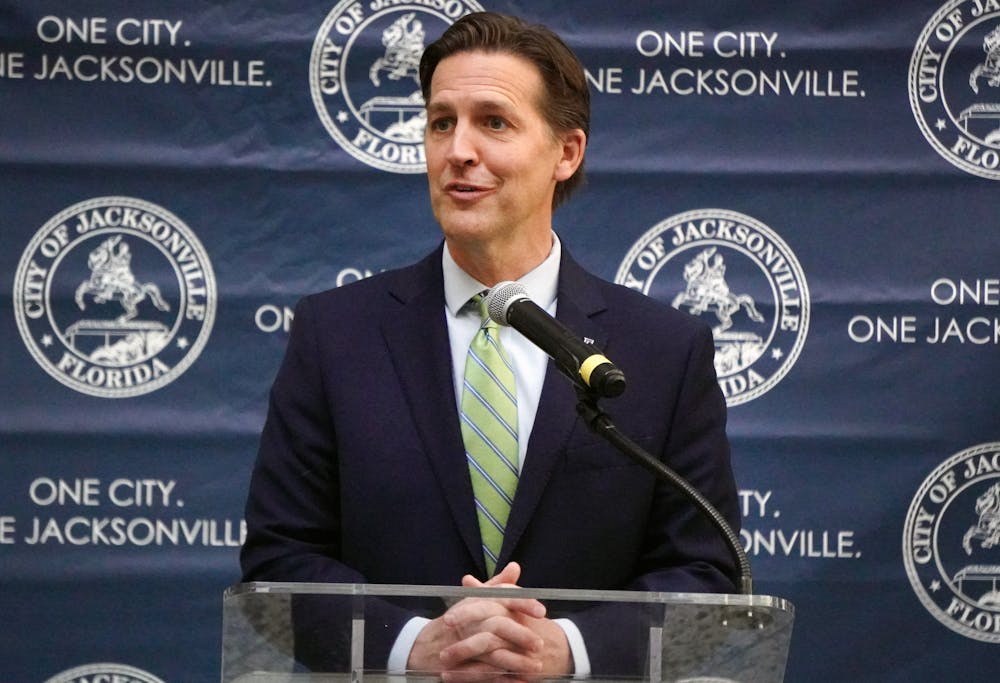The UF Faculty Senate convened in the Reitz Union Thursday to discuss state legislation impacting post-tenure review and general education requirements amid concern from faculty.
The Board of Governors approved a regulation in March that requires tenured faculty to undergo reviews every five years to “ensure high standards of quality and productivity.” The regulation requires each board of trustees in the state university system to implement a post-tenure review system.
Faculty Senate Chair Danaya Wright clarified details regarding the implementation of post-tenure review at UF.
Wright pointed out that the regulation outlines a post-tenure review process based on job performance, not personal relationships.
“You’re not going to be judged on post-tenure review by the fact that you’re a pain in the neck to your dean,” Wright said. “It’s based on your assigned duties.”
Juan Nino, a faculty senator from the College of Engineering, expressed concern over the criteria for post-tenure review to Wright.
“It all falls apart if the assigned duties are not clear,” Nino said.
Other faculty senators expressed concerns that post-tenure review could be used to remove tenure from faculty based on their political beliefs.
Gene Witmer, a faculty senator from the College of Liberal Arts and Sciences, asked Wright if individuals in charge of post-tenure review would be able to subvert the regulation and impose ideological tests.
“It’s set up so one person, the provost, who has all the power and he can make up something because he has an ideological reason and find something to blame it on,” Witmer said. “That’s the thing we have to watch out for.”
Wright told Witmer there will be due process for faculty in the post-tenure review process.
“I don’t think we need a lot of faculty participation for the 90% of files that are going to sail through,” Wright said. “It’s the few files that are not and that is where we are going to need extra attention.”
UF’s post-tenure review process will not contain political criteria, said Wright.
“It is not a political litmus test,” she said.
Associate provosts Chris Hass and Diane Schanzenbach are spearheading the post-tenure review process at UF, according to slides that accompanied Wright’s report.
Hass and Schanzenbach will identify 260 faculty members, including everyone tenured in 2019 and 20% of those tenured before then, for review.
Faculty in each unit are required to develop appropriate post-tenure review criteria and financial compensation will be ensured for productive faculty, according to the slides.
Members of UF administration, including UF President Ben Sasse and interim provost Scott Angle, expressed their support for post-tenure review processes at UF.
Post-tenure review will help address productivity issues among faculty who have “quietly-retired,” Sasse said.
“Post tenure review will give us a tool to get at pieces of it,” Sasse said.
Sasse later clarified in an email sent to faculty the phrase “quiet-retired” was not his own — it was a phrase he has heard repeatedly from faculty members.
“I want to be clear: that’s something you — our faculty — have repeated to me. I'd never heard the term before. But, having spoken with most of our colleges, I have heard it many times,” Sasse wrote. “We can and must do better.”
The current tenure review systems at UF were not sufficiently rigorous, said Sasse told the Faculty Senate.
“I submit to you as somebody who is new and asked lots of questions, I don’t find post-tenure review here,” Sasse said. “We have lots of folks who are extraordinarily productive, we also have a significant number of folks who cease to be research productive overtime.”
Angle also argued post-tenure review would help reduce unproductive faculty in a report he delivered between Sasse’s address and the Faculty Senate meeting.
“I bet everyone in here knows somebody who they think is not carrying their full load,” Angle said.
Angle advocated for a post-tenure review system that prioritizes remediation of low-performing faculty.
“The first step should never be ‘You’re done, time to move,’” Angle said. “If that pathway doesn’t work then we need that pathway to move people to probably a very different decision.
The Board of Trustees is expected to develop guidelines for UF’s post-tenure review process.
They meet next on Sept. 21.
Contact Garrett at gshanley@alligator.org. Follow him on Twitter @garrettshanley.
Garrett Shanley is a fourth-year journalism major and the Spring 2025 university editor for The Alligator. Outside of the newsroom, you can find him watching Wong Kar-Wai movies and talking to his house plants.






